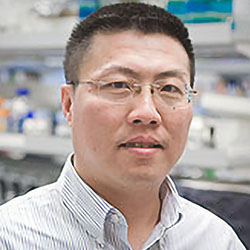Kai Yu, PhD

Specialties
- Academic Title: Assistant Professor
- Research Center: Center for Developmental Biology and Regenerative Medicine
"As a developmental biologist, my goal is to translate knowledge gained from animal model studies into clinical treatments of human birth defects. I am particularly interested in cleft palate, one of the most common birth defects. Although cleft palate can be corrected by surgical treatments after birth, patients with cleft palate need multidisciplinary care and follow-up treatment of complications from birth to adulthood. At Seattle Children's, I combine mouse genetics and state-of-the-art three-dimensional imaging technologies to understand palate morphogenesis during embryonic development and to investigate how various genetic and environmental risk factors disturb normal development to cause cleft palate formation. I hope that one day my research will aid in developing new strategies for prevention, diagnosis and treatment of cleft palate disorders."
-
Biography
Kai Yu, PhD, is an acting assistant professor in the Department of Pediatrics at the University of Washington School of Medicine and a member of the Seattle Children's Research Institute's Center for Developmental Biology and Regenerative Medicine.
Dr. Yu, who was trained in Dr. David Ornitz's lab at Washington University School of Medicine, has focused on the function of fibroblast growth factor receptors (FGFRs) in skeletal development and pathogenesis of human craniosynostosis. At Seattle Children's, Dr. Yu's primary research interests focus on molecular, cellular and morphogenetic mechanisms of normal secondary palate morphogenesis and the pathogenesis of cleft palate. He is also investigating molecular and cellular mechanisms of midfacial hypoplasia caused by mutations in FGFRs. -
Related Resources
-
View the Seattle Children's Research Institute profile of Kai Yu, PhD including their publications and grants.
-
Dr. Kai Yu’s lab studies how craniofacial malformations occur, opening the door to new ways to diagnose, prevent and treat them.
-
-
Patient Testimonials
-
Awards and Honors
Loading...Award Name Award Description Awarded By Award Date {{ award.name }} {{ award.description }} {{ award.organization }} {{ award.displayDate }} No Awards and Honors found for Kai Yu, PhD
-
Publications
Loading...No Publications found for Kai Yu, PhD
-
Presentations
Loading...Presentation Title Event Location Date {{ presentation.title }} {{ presentation.presentedAt }} {{ presentation.location }} {{ presentation.displayDate }} No Presentations found for Kai Yu, PhD
-
Research Funding
Loading...Grant Title Grantor Amount Award Date {{ funding.title }} {{ funding.grantedBy }} {{ funding.amount }} {{ funding.displayDate }} No Research Funding found for Kai Yu, PhD
-
Clinical Trials and Research Studies
Loading...{{ item.st }}
No clinical trials found for Kai Yu, PhD.
